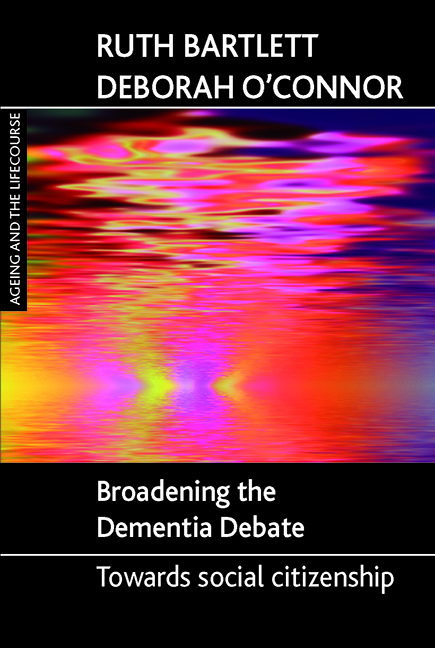one - Introduction
Published online by Cambridge University Press: 01 September 2022
Summary
“I am 46 years old and have the early stages of frontotemporal lobe dementia…. As of now, not many people have decided to ‘come out of the closet’ so to speak, to tell others their story, to tell people what is wrong them. With a lot of hard work, a wonderful doctor, the passage of time, love from family and friends and other people with dementia, I have for the most part overcome this stigma.” (Jackson, 2009)
“I am Richard Taylor, and for nearly a decade I have lived with the diagnosis of dementia, probably of the Alzheimer's type. I have discovered that thinking, speaking, and writing about what it is like for me to live with this condition has become the purpose of my life.” (Richard Taylor, PhD, www.richardtaylorphd.com/)
“My name is Terry Pratchett, author of a series of inexplicably successful fantasy books and I have had Alzheimer's now for the past two years plus, in which time I managed to write a couple of bestsellers. I have a rare variant. I don't understand very much about it, but apparently if you are going to have Alzheimer's it's a good one to have. (Terry Pratchett, addressing the Alzheimer's Research Trust Conference in the UK, March 2008, www.terrypratchettbooks.com/)
The theme of World Alzheimer's Day 2007 was: ‘No time to lose – people with dementia speak out!’. And people have. After decades of being silenced, marginalised and discriminated against, people with dementia are beginning to use their voice and to speak out about their experiences. Men and women like Richard Taylor, Lynn Jackson, Jim Mann and Terry Pratchett have spoken at major conferences and public events to raise awareness of the discrimination they and other people with dementia face. Others have spoken or written candidly about the impact of dementia on their everyday lives in newsletters, at health committee meetings, through the media and in other public spheres. More still have participated on decision-making boards and taken part in fundraising and consultation events. Importantly, those without dementia are listening: Lynn, Richard and Terry have all been given a standing ovation when they presented their stories at major international conferences.
The call for people with dementia to speak out suggests that this group are now being seen not only as people but also as equal citizens, with the power to influence and bring about social change.
- Type
- Chapter
- Information
- Broadening the Dementia DebateTowards Social Citizenship, pp. 3 - 16Publisher: Bristol University PressPrint publication year: 2010



